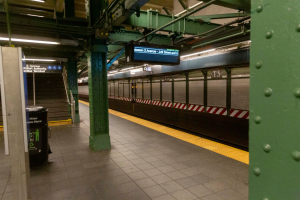Weekend Link Roundup (March 21-22, 2020)
 There’s no other way to put it: we’ve just experienced one of the most extraordinary weeks in our lifetimes. On the off-chance you were rafting the Grand Canyon, here’s our weekly roundup of noteworthy items from and about the social sector — and, yes, it’s heavy on coronavirus-related items. For more links to great content, follow us on Twitter at @pndblog….
There’s no other way to put it: we’ve just experienced one of the most extraordinary weeks in our lifetimes. On the off-chance you were rafting the Grand Canyon, here’s our weekly roundup of noteworthy items from and about the social sector — and, yes, it’s heavy on coronavirus-related items. For more links to great content, follow us on Twitter at @pndblog….
Economy
“This is not a hoax. Repeat, this is not a hoax.” Multinational investment bank Morgan Stanley sees the U.S. economy falling into a deep recession in the second quarter, with GDP plunging 30 percent and unemployment spiking to nearly 13 percent. “Economic activity has come to a near standstill in March,” the bank’s economists said in a report to clients on Sunday. “As social distancing measures increase in a greater number of areas and as financial conditions tighten further, the negative effects on near-term GDP growth become that much greater.”
Education
On the Brookings site, Nicol Turner Lee, a governance studies fellow in the Center for Technology Innovation, notes that “[w]ith a disproportionate number of school-age children lacking home broadband access, the breadth of the U.S. digital divide has been revealed [by the pandemic] as schools struggle to substitute in-school resources with online instruction, electronic libraries, streaming videos, and other online tutorials.”
Philanthropy
More than 200 (and counting) foundations — private, community, and public — have signed a pledge spearheaded by the Ford Foundation in partnership with the Council on Foundations to take urgent action “over the days, weeks, and months ahead” to help people and communities hit hardest by the impacts of COVID-19, including loosening or eliminating restrictions on current grants; reducing reporting requirements, site visits, and other demands; contributing to community-based emergency response funds and other efforts to address the health and economic impact on those most affected; communicating proactively and regularly about decision-making and response efforts; and committing to listening to partners and, especially, to those communities whose voices are least heard.
Foundations and other endowed institutions tend to be quite protective of their corpora, thinking that they need to be saved for a rainy day. Nonprofit AF’s Vu Le has a message for those institutions: This is your rainy day.
In New York City, which now has more COVID-19 cases than other locale in the United States, a group of foundations has created a $75 million fund, the NYC Covid-19 Response & Impact Fund, to help social service and arts and cultural organizations survive the slew of demands and cancellations brought on by the coronavirus outbreak. Geoff Edgers and Peggy McGlone report for the Washington Post.
On the Wired site, Rob Reich, a professor of political science at Stanford University and author of Just Giving: Why Philanthropy is Failing Democracy and How It Can Do Better, and Mohit Mookim, a researcher at Stanford’s Center for Ethics in Society, argue that when government fails us, we need to resist the temptation to look to rich people like Bill Gates. “[S]sure, private funding of global public health is valuable. But the demands of fighting a pandemic are much bigger than the capacity of even our wealthiest private philanthropists.” That said, big philanthropy does have a role to play in a crisis like this, write Reich and Mookim. “Its distinctive and essential function is to serve as the risk capital for a democratic society, directing resources to fund experiments and discover solutions to social problems that neither the market nor government is well-suited to do.”
Our colleagues at Candid are tracking the philanthropic response to the COVID-19 pandemic, including a list of funds — more than a hundred and forty and many locally focused — specifically established to address emergency needs and the social and economic impacts of COVID-19. And here on PhilanTopic, our ood friend and sector veteran Michael Seltzer has some excellent advice for funders looking to boost their impact in the COVID-19 era.
Public Affairs
The folks at Independent Sector are tracking the U.S. Senate’s efforts to pass a COVID-19 relief package — the third such package to be assembled by Congress this week — with a particular eye on its provisions (or lack thereof) for nonprofits (Small Business Administration loans; universal charitable deduction). IS will be holding a call Monday, March 23, at 11:00 am ET to share the latest. (Registration required.)
Public Health
The numbers for tracking the progress of the COVID-19 pandemic are grim. But this is probably the most-up-to-date and frequently updated source for them.
The interactives team at the New York Times has put together a startling visualization showing how the virus spread from its source of origin in Wuhan, China.
So, what can we expect over the next eighteen months? Your guess is as good as mine. But probably not as good as epidemiologist Larry Brilliant’s, the founding executive director of Google.org, here in conversation with Wired.
And in a truly comprehensive and statistically impressive article on Medium, Thomas Pueyo (with the help of “a group of normal citizens working around the clock to find all the relevant research available to structure it into one piece”) crunches the numbers and argues that we can avoid the worst-case scenario — if government and our public health officials move now to buy us time.
(Photo: New York Post: Taidgh Barron)
That’s it for now. Drop us a line at [email protected] if you have something you’d like to share.






